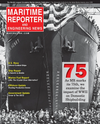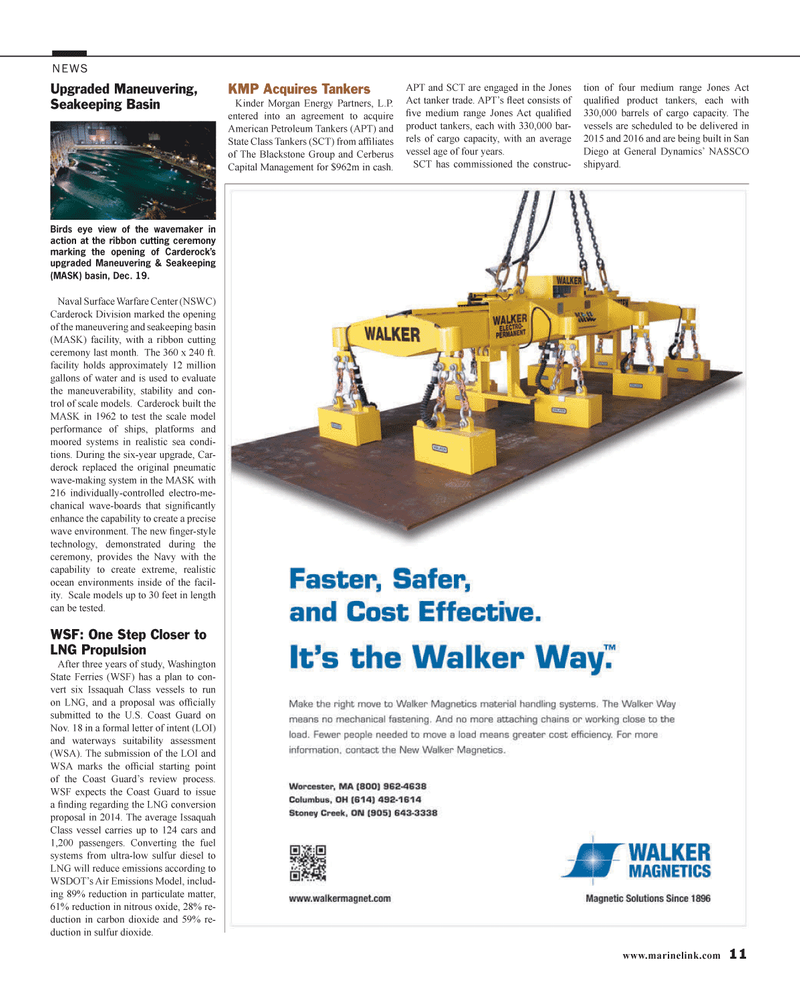
Page 11: of Maritime Reporter Magazine (January 2014)
Ship Repair & Conversion Edition
Read this page in Pdf, Flash or Html5 edition of January 2014 Maritime Reporter Magazine
www.marinelink.com 11
Upgraded Maneuvering,
Seakeeping Basin
Birds eye view of the wavemaker in action at the ribbon cutting ceremony marking the opening of Carderock’s upgraded Maneuvering & Seakeeping (MASK) basin, Dec. 19.
Naval Surface Warfare Center (NSWC)
Carderock Division marked the opening of the maneuvering and seakeeping basin (MASK) facility, with a ribbon cutting ceremony last month. The 360 x 240 ft. facility holds approximately 12 million gallons of water and is used to evaluate the maneuverability, stability and con- trol of scale models. Carderock built the
MASK in 1962 to test the scale model performance of ships, platforms and moored systems in realistic sea condi- tions. During the six-year upgrade, Car- derock replaced the original pneumatic wave-making system in the MASK with 216 individually-controlled electro-me- chanical wave-boards that signifi cantly enhance the capability to create a precise wave environment. The new fi nger-style technology, demonstrated during the ceremony, provides the Navy with the capability to create extreme, realistic ocean environments inside of the facil- ity. Scale models up to 30 feet in length can be tested.
WSF: One Step Closer to
LNG Propulsion
After three years of study, Washington
State Ferries (WSF) has a plan to con- vert six Issaquah Class vessels to run on LNG, and a proposal was offi cially submitted to the U.S. Coast Guard on
Nov. 18 in a formal letter of intent (LOI) and waterways suitability assessment (WSA). The submission of the LOI and
WSA marks the offi cial starting point of the Coast Guard’s review process.
WSF expects the Coast Guard to issue a fi nding regarding the LNG conversion proposal in 2014. The average Issaquah
Class vessel carries up to 124 cars and 1,200 passengers. Converting the fuel systems from ultra-low sulfur diesel to
LNG will reduce emissions according to
WSDOT’s Air Emissions Model, includ- ing 89% reduction in particulate matter, 61% reduction in nitrous oxide, 28% re- duction in carbon dioxide and 59% re- duction in sulfur dioxide.
KMP Acquires Tankers
Kinder Morgan Energy Partners, L.P. entered into an agreement to acquire
American Petroleum Tankers (APT) and
State Class Tankers (SCT) from affi liates of The Blackstone Group and Cerberus
Capital Management for $962m in cash.
APT and SCT are engaged in the Jones
Act tanker trade. APT’s fl eet consists of fi ve medium range Jones Act qualifi ed product tankers, each with 330,000 bar- rels of cargo capacity, with an average vessel age of four years.
SCT has commissioned the construc- tion of four medium range Jones Act qualifi ed product tankers, each with 330,000 barrels of cargo capacity. The vessels are scheduled to be delivered in 2015 and 2016 and are being built in San
Diego at General Dynamics’ NASSCO shipyard.
NEWS
MR #1 (10-17).indd 11 1/8/2014 1:23:04 PM

 10
10

 12
12
